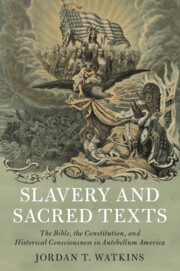 Slavery and Sacred Texts
Slavery and Sacred Texts Published online by Cambridge University Press: 12 June 2021
The introduction outlines the book’s argument that biblical and constitutional debates over slavery introduced a sense of historical distance from the founding era and the biblical past. It also defines key terms, including historical distance, sacred texts, and favored pasts, and outlines developments by which the Bible maintained its status as a sacred text, while the Constitution achieved a similar kind of status in antebellum America. These developments set the stage for the process by which debates over slavery began to historicize the biblical and constitutional pasts. This process corresponded with the broader emergence of a modern historical consciousness. And yet, the nature of American religious and legal culture, and the presence of slavery, gave unique shape to American historical awareness. The book makes its most innovative move in showing how slavery encouraged interpretive shifts to read both the Bible and the Constitution as historical texts. I focus on a range of thinkers and interpreters and read their writings with an eye toward measuring historical consciouness. This approach demonstrates that the crisis over slavery in America became a crisis of historicity.
To save this book to your Kindle, first ensure no-reply@cambridge.org is added to your Approved Personal Document E-mail List under your Personal Document Settings on the Manage Your Content and Devices page of your Amazon account. Then enter the ‘name’ part of your Kindle email address below. Find out more about saving to your Kindle.
Note you can select to save to either the @free.kindle.com or @kindle.com variations. ‘@free.kindle.com’ emails are free but can only be saved to your device when it is connected to wi-fi. ‘@kindle.com’ emails can be delivered even when you are not connected to wi-fi, but note that service fees apply.
Find out more about the Kindle Personal Document Service.
To save content items to your account, please confirm that you agree to abide by our usage policies. If this is the first time you use this feature, you will be asked to authorise Cambridge Core to connect with your account. Find out more about saving content to Dropbox.
To save content items to your account, please confirm that you agree to abide by our usage policies. If this is the first time you use this feature, you will be asked to authorise Cambridge Core to connect with your account. Find out more about saving content to Google Drive.